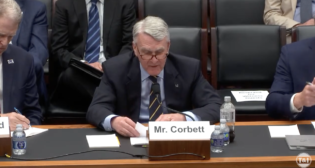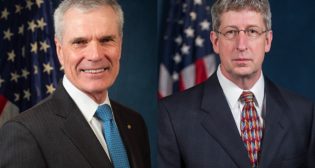
Rapid confirmation seen for STB nominees
Written by Frank N. Wilner, Capitol Hill Contributing Editor
Capitol Hill Contributing Editor Frank N. Wilner
Senior Senate legislative aide Patrick J. Fuchs and commuter railroad attorney Michelle A. Schultz, both Republicans, appeared April 11 before the Senate Commerce Committee as a first crucial step toward Senate confirmation to become members of the Surface Transportation Board (STB), which administers remnants of what until 1980 was almost a century of pervasive railroad economic regulation.
Commerce Committee Chairman John Thune (R-S.D.) said he would move aggressively to expedite the process—the next step being a committee vote on whether to recommend confirmation of Fuchs and Schultz by the entire Senate.
If confirmed, they would join Republican Chairman Ann Begeman and Democratic member Deb Miller on the five-member board, leaving a Democratic vacancy to be filled. There is no statutory quorum requirement for the STB, and the Board has operated since September with three vacancies—two of them since 2015 when legislation expanded the STB’s size from three to five members.
As President Trump has yet to nominate a Democrat, there was speculation that Senate Minority Leader Chuck Schumer (D-N.Y.) would use a parliamentary procedure to delay a confirmation vote on Republicans Fuchs and Schultz.
That speculation may now be moot, as Schumer appeared at the April 11 confirmation hearing to speak in support of Federal Trade Commission nominee Rebecca K. Slaughter, a Democrat, also seeking Commerce Committee approval. Schumer’s interest in having Slaughter confirmed quickly suggests strongly that the three names—Republicans Fuchs and Schultz to the STB, and Slaughter to the FTC—will move as a single package and receive rapid Senate confirmation, notwithstanding a Democratic nominee to the STB has yet to be named.
While confirmation hearings for Cabinet-level posts and regulatory agencies in the public eye and media spotlight can be contentious affairs, hearings for nominees to the largely backwater STB typically are sedate events—as was this one. Although previous STB nominees have been lectured by senators on behalf of captive shippers unhappy with the course of partial railroad economic deregulation, the questions asked of the STB nominees at this hearing were excessively tame.
Indeed, the shipper lobby should be anxious, as the current paramount regulatory reform objective of captive shippers is to gain an STB ruling allowing for competitive access—the STB issuing an order requiring railroads to open a sole-served, privately owned facility for use by a competing railroad so that the competitor may extend the reach of its services and, arguably, force freight rates down. Not a single senator spoke on that issue at the hearing, even though it is one of the highest priority cases awaiting action when new STB members arrive.
As for issues that were raised, Fuchs and Schultz repeatedly responded to their Senate interrogators with assurances they would be proactive in using the board’s investigative tools, work with STB staff and stakeholders, follow the law, and collaborate with fellow board members to the extent allowed by the Government in Sunshine and STB statutes.
Of greatest concern to several senators appearing at the hearing was the STB’s stand-alone cost (SAC) test for judging the reasonableness of freight rates charged captive shippers—those lacking effective transportation alternatives to rail. Fuchs and Schultz agreed that the existing process is overly complex and costly, and indicated they are fellow travelers with Begeman and Miller to reform it.
Fuchs has been studying railroad regulatory issues at the Commerce Committee as a senior staff member since January 2015, reporting to Thune. “Patrick drafted and played a critical role in the successful passage of the Surface Transportation Board Reauthorization Act, the first reauthorization of the Board since its creation,” Thune said.

Patrick Fuchs
While not committing himself to how he might vote if confirmed—as no sane nominee ever does—Fuchs’ responses were peppered with informed references to the statute and cases currently before the STB. With his shock of hair and infectious smile suggestive of a Kennedy, an animated speaking style and full command of the subject matter, it was clear why Fuchs’ nomination has drawn enthusiastic support from shippers and railroads, and from senators on both sides of the aisle who have observed his work and work ethic.
Before Trump named Begeman permanent chairman in March, there was chatter Fuchs was being considered for the role, given his existing mastery of the subject matter and Begeman’s earlier indication she did not wish the chairmanship.
This could signal tensions ahead, as Begeman, another Commerce Committee veteran and long an expert in the STB’s sometimes bewildering subject matter, is a fiercely independent thinker, sphinx-like in collegial settings, and possessing a tendency to shunt aside Republican tenets of less government involvement in consideration of captive shipper concerns. The STB chairman solely controls the agency’s docket and drafts its decisions.
Indeed, Begeman earned the sobriquet, “dissenter in chief,” when Democrat Dan Elliott was chairman. Elliott voluntarily departed the STB in September, during a second term, to enter private law practice.
Schultz clearly struggled with the subject matter during committee questioning, sometimes hesitating with her answers—but understandable given that her tenure as deputy general counsel for the Southeastern Pennsylvania Transportation Authority (SEPTA) has mostly been in the area of procurement, major capital projects and commuter rail issues. She would be the lone attorney member of the STB—historically attorneys have been a majority—although the awaited Democratic nominee is expected also to be an attorney.

Michelle Schultz
Sources present at some of Schultz’ personal interviews with senators and current STB members over the past weeks call her extremely bright, a focused listener and eager to learn. She was described by one source present during an interview as “someone who takes her work seriously … but overwhelmed by the concepts.” Schultz would not be the first member of the STB or its Interstate Commerce Commission predecessor arriving with less than a steeped background in the agency’s subject matter. Thune called her “extremely qualified” in an opening statement.
While Fuchs’ wife and parents were in attendance and recognized by Sen. Thune, Schultz’ spouse, James D. Schultz, was not. This cannot be ignored because he is a former White House associate counsel to President Trump (January-November 2017), and frequently appears as a talking head on CNN’s “Anderson Cooper 360” news show, where he defends President Trump’s positions and tweets.

James D. Schultz, husband of Michelle Schultz, is a former White House associate counsel to President Trump and frequently appears on CNN’s “Anderson Cooper 360”, where he defends Trump’s positions and tweets.
In addition to Thune, Commerce Committee members asking questions of Fuchs and Schultz included the committee’s senior Democrat, Bill Nelson of Florida, and Senators Roy Blunt (R-Mo.), Maria Cantwell (D-Wash.), Catherine Cortaz Masto (D-Nev.), Dean Heller (R-Nev.), Jim Inhofe (R-Okla.), Edward Markey (D-Mass.), Gary Peters (D-Mich.), and Roger Wicker (R-Miss.).
Nelson, facing a November Senate election challenge by Florida Republican Gov. Rick Scott, focused mostly on restoring Gulf Coast Amtrak service to Florida, a desire to see high-speed rail in Florida, and Amtrak delays over host freight railroad track—subjects where the STB has limited involvement. Fuchs, who also helped in drafting, on behalf of Commerce Committee Republicans, the first rail-passenger service reauthorization in almost a decade—which instituted reforms to improve Amtrak’s performance—advised that a previous STB attempt to establish metrics and standards for passenger trains operating on freight railroad tracks was invalidated by a federal appeals court.
Wicker expressed uneasiness with the complexity and cost of the SAC process; Cortaz Masto and Heller conveyed concern with the route safety of nuclear waste moving by train to a Yucca Mountain, Nev., disposal site; Cantwell suggested “new strategies” beyond congestion pricing to ease car shortage concerns affecting grain shippers; and Peters called attention to automobile shippers facing shortages of bi-level and tri-level auto racks, and shared Wicker’s unease with the SAC process.
Prior to joining the Senate Commerce Committee staff in January 2015, Fuchs was a policy analyst with the White House Office of Management and Budget, a State Department Presidential Management Fellow serving in The Hague, Netherlands, and a research assistant at the National Center for Freight and Infrastructure Research and Education.
From the University of Wisconsin, Fuchs earned a double-major undergraduate degree in economics and political science, and a master’s degree in public policy analysis and management, with an emphasis on transportation policy, economics and statistics. He participated in an international academic program with the University of Singapore, focusing on international policy and economics.
Schultz has been SEPTA’s deputy general counsel since January 2014, having joined SEPTA in 2006 as manager, and later director, of legislative affairs. Earlier in her career, she was an associate with the Philadelphia-based law firm of White and Williams, dealing with bankruptcy and commercial litigation, and a law clerk with the U.S. Bankruptcy Court for the Eastern District of Pennsylvania.
She earned an undergraduate degree in English from Penn State, a master’s degree in government administration from the University of Pennsylvania, and a law degree from Widener University.



